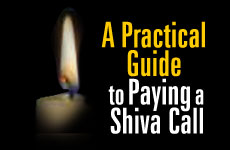 Iran’s Attack on Israel
Iran’s Attack on Israel


3 min read
A short primer on how to comfort a mourner.
When one pays a shiva call, the focus is on comforting the mourners in their time of greatest grief. Traditionally, one enters the shiva house quietly with a small knock so as not to startle those inside. No one needs to greet visitors; they simply enter on their own.
Food or drinks are not laid out for the visitors, because the mourners are not hosts. They do not greet the visitors, rise for them, or see them out.
When entering the house, you should not greet the mourners. In fact, it is best to come in silently and sit down close to them. Take your cue from the mourners. If they feel like speaking, let them indicate it by speaking first. Let them lead and talk about what they want to talk about. It is best to speak about the one who has passed away, and if you have any stories or memories to share with the mourner, this is the time to do so.
This is not a time to distract them from mourning. Out of nervousness, we often make small talk because we do not know what to say. Don't fill in the time talking about happy subjects or inconsequential topics like politics or business.
Often, the best thing to say is nothing. A shiva call can sometimes be completely silent. If the mourner does not feel like talking at that time, so be it. Your goal is not to get them to talk; it is to comfort them. Your presence alone is doing that. By sitting there silently, you are saying more than words can. You are saying: "I am here for you. I feel your pain. There are no words."
And sometimes there aren't any. Here are examples of things not to say:
Remember that speaking about the loved one they lost is comforting. It's alright if they cry; they are in mourning. It is all part of the important process of coming to grips with such a loss.
You should not overstay your visit. Twenty minutes will suffice. When other visitors arrive and space is a concern, it is certainly time to leave.
Before leaving, one stands up, approaches the mourner and recites, "HaMakom yenacheim etchem betoch sha'ar aveiliei Tzion v'Yerushalayim" -- May the Almighty comfort you among those who mourn for Zion and Jerusalem. One can read this phrase from a sheet of paper.
Upon leaving the house of the mourner, it is customary to give charity in memory of the one who passed away, may his soul be elevated.
